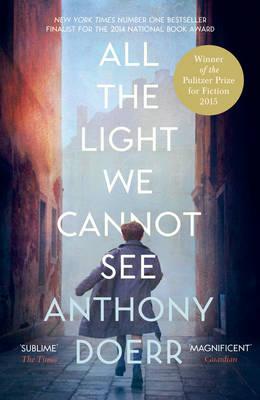 All the Light We Cannot See is a historical novel by American author Anthony Doerr that won the 2015 Pulitzer Prize for Fiction.
All the Light We Cannot See is a historical novel by American author Anthony Doerr that won the 2015 Pulitzer Prize for Fiction.
Doerr, who lives in Boise, Idaho, tells the story of the coming of age of two children in the build up to and later outbreak of the Second World War in Western Europe.
There is the story of beautiful blind French girl Marie-Laure Leblanc who lives with her doting father in an apartment in Paris and loves reading, especially the adventure stories of Jules Verne.
Alongside her tale, Doerr narrates the story of German boy Werner Pfenning, who grows up in an orphanage with his sister Jutta in a harsh coal mining town.
The war breaks out and Marie-Laure and her father flee Paris and the Nazis to live with her charismatic aunt Madame Manec and her reclusive uncle Etienne in their tall, narrow house in Saint-Malo, a walled French maritime town on the English Channel.
Over in Germany, Werner, a sensitive and kind boy, becomes old enough to be sent to work down the mines – a job which killed his father – but is saved from this fate by his ability to fix radios.
After skilfully repairing the radio of a Nazi commander’s girlfriend, Werner is selected to attend the elite Nazi academy, The National Political Institute of Education, where he receives formal training in electronics and helps create a gadget to locate enemy radio transmissions, but where he is also exposed to cruel Nazi ideology about the ‘master race’ and witnesses first hand its brutal methods.
Marie-Laure meanwhile must cope with the disappearance of her beloved father, who never returns from a trip to Paris, and learn to use the wooden model of Saint-Malo that he crafted for her, to help her navigate the streets of the walled town.
As the war heads towards it destructive conclusion and the Nazis invade Saint-Malo the two young characters are drawn closer and closer through the power of radio: Werner, still only a teenager, has been drafted into the army, where his job as part of a truck unit that rumbles through the decimated countryside is to use the electronic device he helped design, to detect the locations of enemy radio transmissions (and eliminate the perpetrators); at the same time Marie-Laure collects bread from the local bakery with coded message for the French resistance baked into the loaves, that her uncle then reads out through a secret radio broadcast from the top floor attic of their home.

Anthony Doerr
Doerr says the idea to put radio at the heart of his story came to him about 10 years ago when he was on a train pulling into Penn Station in New York and a guy was getting more and more angry because his phone call kept dropping out.
“How did we get to the point that we took this technology for granted? …All this invisible light that carries messages. I felt we had forgotten what a magical thing that was,” he said.
In Europe during the war it was radio which had this magical power to connect people who were thousands of miles apart and which played a crucial role in the outcome of the war.
“When I was thinking about strategies for writing this book, all I knew was that I wanted to have a blind girl reading a book (Jules Verne’s 20,000 Leagues Under the Sea) over the radio to a boy,” Doerr says.
On a trip to France, he visited the beautiful town of Saint-Malo and says he was amazed to discover it had been practically flattened by American bombs and then restored almost brick by brick.
“I knew somehow the boy would be trapped and needing this radio transmission as some kind of life line,” Doerr said in the same interview.
He spent 10 painstaking years writing and crafting the complex book and was rewarded with it winning the Pulitzer Prize and becoming a huge commercial success.
While it is a brilliant story with many memorable characters and a powerful message about bravery and human decency in the face of terrible circumstances , I was a little disappointed with Doerr’s decision to write it in short chapters that not only move back and forwards between the lives of Marie-Laure and Werner , but also move back and forwards in time, between 1934 and the end of the war.
I found it created a disjointed rhythm and was sometimes confusing, requiring that I page back to see what period of time he was were referring to understand where I was in the sequence of events.
Also, at more than 500 pages, I felt it was unnessarily long and could have been even more powerful as a shorter book. While sometimes Doerr’s verbosity is warranted – he loves delving into how things work, the history of a minor event or character and delivering incredibly detailed descriptions – at times it feels overdone and rambling.
But, then again I am someone who likes the pared-down writing style of Hemingway, Orwell, Bukowski and Carver so maybe that’s just me. Others readers may love luxuriating in all the detail: after all it is an epic tail stretched out over a vast canvas, indeed it has major Hollywood film written all over it.
As a follow-up, if you have not yet read it yet, I suggest Australian writer Anna Funder’s All That I am, also set during the Second World War, about a group of German refugees who flee to London to escape the Nazis.


 There’s a brilliant documentary floating about called
There’s a brilliant documentary floating about called 